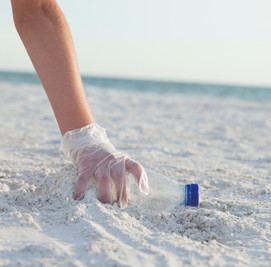One Earth - One Ocean (OEOO) is an environmental organization focused on ocean health. The group is based in Munich, Germany with other international locations. Reducing and cleaning up plastic pollution is necessary for marine life and human health. The full risk of hormonal effects to humans or marine life are not well understood yet
The organization has been building a fleet of various size vessels to gather plastic from coastal waters or the open ocean and then process it into recyclable plastic or fuel. Small raft like vehicles that can be self propelled/automated collect and bag plastic in coastal areas and leave it floating with a GPS location sensor. Slightly larger vessels collect the bags and deliver them to the tanker that is also a processing plant for sorting the plastics and making recycled plastic pellets or fuel out of the different types. (oneearth-oneocean.com)
Along with the company DEUREX, the group OEOO has developed PURE baled wadding an award winning oil absorbing fiber. The fiber floats, absorbing oil spills, and it can then be gathered up from the surface of the water and reused after the oil is squeezed out - like a sponge designed specifically to absorb oil spills instead of absorbing water. (oneearth-oneocean.com)
By the year 2050 at the current rate of plastic pollution it is estimated that there will be more plastic in the ocean than fish (estimated by weight in tons). It can take 450 years for plastic to fully break down, long before that it breaks apart into small particles of plastic. Larger pieces are taken as food by marine animals and build up in the animal's bodies leading to premature death due to blockage of their digestive systems. The microparticle size pieces enter the food chain within microorganisms or small marine species or within the bodies of filter feeding animals such as whales.
Microplastics Endanger Whales and Sharks (and smaller filter feeders) (dw.com)
Bioplastics is a new industry working on different types of plastics which are still more expensive than the current fossil fuel based plastic. The new plastics being developed are of different types, some based on non fossil fuel products such as sugar or vegetable oil, some that biodegrade readily, and some that are based on non fossil fuel products and which biodegrade easily. The types that don't biodegrade readily need to be recycled and processed separately from fossil fuel based plastics.
Could Bio-Plastics Help Ease Single-Use Plastic Waste? (Morgan Stanley)
Disclaimer: Information is provided for educational purposes within guidelines of fair use.























Commenti